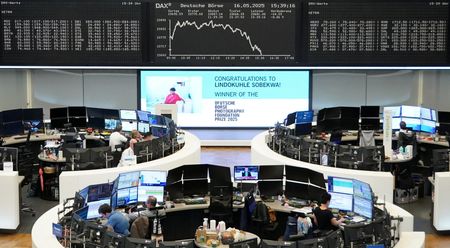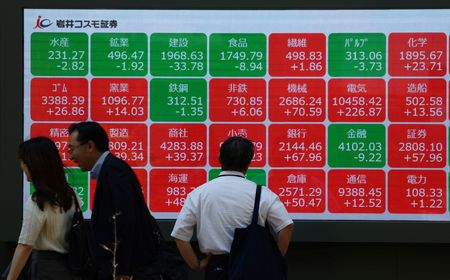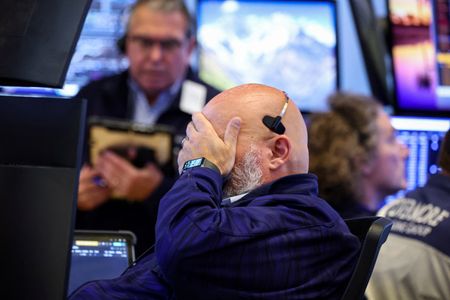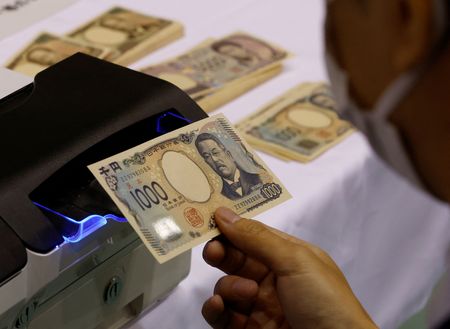By Chris Prentice and Stella Qiu
NEW YORK/SYDNEY (Reuters) -Wall Street gained on Friday, as European shares climbed to a fifth straight weekly gain on upbeat earnings that helped sustain the rally sparked by a U.S.-China trade truce.
Gold prices were set for their biggest weekly loss since November.
Oil futures notched a weekly gain but remain relatively low, further supporting stocks and bonds.
MSCI’s gauge of stocks across the globe rose 0.5%.
U.S. consumer sentiment slumped further in May as one-year inflation expectations surged as households remained concerned about the economic impact of President Donald Trump’s aggressive and often erratic trade policy, a University of Michigan survey showed.
Yields on U.S. Treasuries fell after data showed weaker housing starts than expected.
The Dow Jones Industrial Average rose 331.99 points, or 0.78%, to 42,654.74, the S&P 500 rose 41.45 points, or 0.70%, to 5,958.38 and the Nasdaq Composite rose 98.78 points, or 0.52%, to 19,211.10.
It has largely been a positive week for global equity markets, as investors cheered a tariff truce between the United States and China that greatly reduces the risk of a global recession.
“The risk-on mood is still here on markets,” said Nabil Milali, strategist Multi-Asset & Overlay at Edmond de Rothschild, also pointing to news that the European Union and the U.S. have agreed to intensify talks on a possible trade agreement, and a better-than-expected earnings season.
“The fact that we have more positive surprises is a very good thing for European stocks.”
The pan-European STOXX 600 index finished up 0.4%, rounding off a fifth week of gains, as strong corporate results bolstered gains seen on the trade war pause.
Earnings in the region have shown resilience, with first-quarter results now expected to increase more than previously thought, LSEG data showed earlier in the week.
U.S. import prices unexpectedly rose in April as a surge in the cost of capital goods offset cheaper energy products.
“We are in the early stages of a trade transition. As of April, the impacts are unclear; however, we know that uncertainty pushed residential builders off balance,” said Jeffrey Roach, Chief Economist for LPL Financial in Charlotte, North Carolina, on import prices and housing and building data.
Data showed U.S. single-family housing starts fell 2.1% on a seasonally adjusted basis in April as tariffs on imported materials and high mortgage rates remained obstacles for the housing market. The report helped push yields lower.
MSCI’s main gauge of Asia-Pacific stocks ex-Japan rose more than 3% this week.
Oil prices have been choppy this week, rising on the U.S.-China deal, before falling 2% on Thursday on increased supply pressure from an OPEC+ output hike and the prospect of an Iranian nuclear deal.
Brent futures settled up 1.4%. [O/R]
U.S. core retail sales were soft and producer prices fell unexpectedly in April, increasing market bets to 57 basis points of easing from the Federal Reserve this year, from 49 bps.
“The relief from softer U.S. retail sales and PPI was palpable in the bond market yesterday and overnight,” said Kenneth Broux, head of corporate research FX and rates at Societe Generale.
“This poured cold water on the (global) bond sell-off and put the brakes on the hawkish repricing of the Fed outlook.”
The benchmark 10-year Treasury yield fell 1.2 basis points to 4.443%, extending Thursday’s drop. [US/]
Walmart, the world’s largest retailer, said it would have to start raising prices later this month due to the high cost of tariffs.
“The relief is just temporary,” Edmond de Rothschild’s Milali said, as the tariff shock is still “very significant.”
The dollar edged higher against a basket of currencies.[FRX/]
Spot gold fell 1.38% to $3,195.16 an ounce, and U.S. gold futures finished down 1.2%. [GOL/]
(Reporting by Chris Prentice, Stella Qiu and Linda Pasquini; Editing by Amanda Cooper, Kirsten Donovan, Deepa Babington, Chizu Nomiyama and Aurora Ellis)












